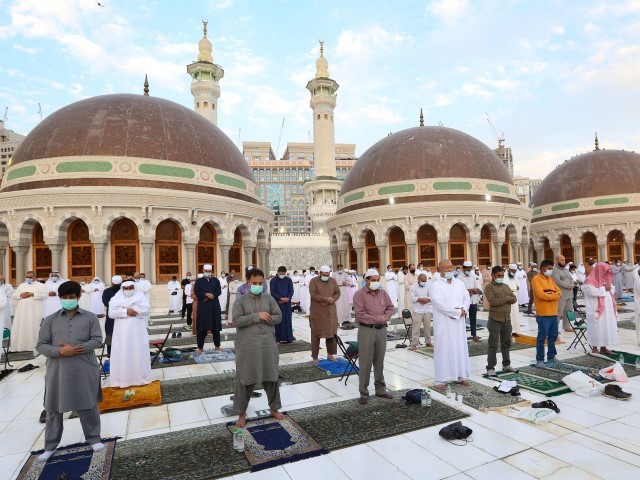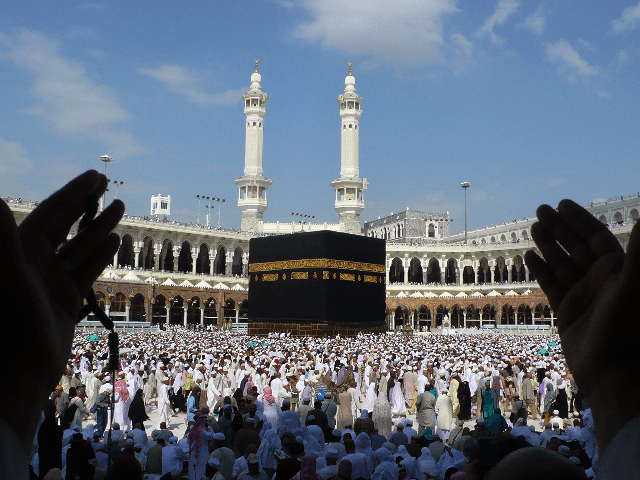Iran Air, the national airline, announced on Wednesday that it would not be able to make its promised flights to Saudi Arabia because Riyadh had not finalized the permits it needs to enter Saudi airspace.
The much-anticipated flights – expected to reach the city of Jeddah, Saudi Arabia, from Tehran, Mashhad, and Isfahan – were intended to bring Iranian pilgrims to participate in the Umrah, an Islamic pilgrimage to the city of Mecca.
Mecca is the holiest city in Islam and visiting it for the Hajj, the holiest pilgrimage, is mandatory for able-bodied Muslims. The Umrah is a shorter, voluntary pilgrimage a Muslim can make at any time of year.
According to Iran International, a dissident outlet, “approximately six million Iranians have been awaiting the resumption of Umrah” since 2015. The flights expected to begin this week were estimated to have brought 30,000 Iranians to Saudi Arabia for the religious pilgrimage and Iranian officials had anticipated that as many as 400,000 Iranians were to have made Umrah by summer 2024.

File/Muslim worshippers perform the Eid al-Fitr morning prayer at the Grand Mosque in Saudi Arabia’s holy city of Mecca to mark the end of the fasting month of Ramadan, on May 13, 2021. (ABDULGHANI ESSA/AFP via Getty Images)
Iran and Saudi Arabia have not allowed direct flights in eight years and halted Umrah flights specifically in 2015, when the Yemen civil war erupted. The delayed flights were expected to begin on Thursday. The agreement to resume flights is one of several deals brokered by communist China between Iran and Saudi Arabia last year. Diplomats from both nations announced in a surprise meeting in Beijing in March 2023 that they had agreed to begin the process of normalizing diplomatic ties after years of strife, exacerbated by Iranian proxy terrorist groups bombing Saudi targets, particularly the Yemeni Houthi jihadist insurgency. The Chinese Communist Party declared itself the world’s premier peacemaker as Riyadh and Tehran agreed to reopen embassies, resume flights, and gingerly resume government-to-government contact.
The Umrah flight cancelations are the first sign of any potential discord between Iran and Saudi Arabia since their rapprochement in March. According to Iran’s state-run Islamic Republic News Agency, Iranian officials struggled to downplay the significance of the situation in light of the greater diplomatic situation regarding the two countries.
Iranian Minister of Culture Mohammad-Mehdi Esmaeili described the situation as a “technical disagreement” that prevented Iran Air from obtaining the permits necessary to fly and emphasized that it was “nothing serious.” The regional site Middle East Monitor nonetheless noted that some observers worried that the flights not beginning “may signal a deterioration in the two countries’ recently-resumed relations.”

Saudi special forces salute in front of a screen displaying images of Saudi King Salman (right) and Crown Prince Mohammed bin Salman after a military parade in preparation for the annual Hajj pilgrimage in Mecca, Saudi Arabia, on July 3, 2022. (AP Photo/Amr Nabil)
Saudi authorities have yet to weigh in on the situation at press time. Iranian officials did not offer any timeline for when the permit situation is expected to be resolved, according to the available English-language reports.
Iran first announced that it would allow flights with Saudi Arabia in March 2023, following the surprise Beijing announcement of the restoration of ties.
“After studying the issue, the necessary and official permits for these flights will be issued and flights will be carried out between the two countries,” a spokesman for the Iranian Civil Aviation Organization, Jafar Yazarlou, told the Iranian regime-friendly Tasnim News Agency that month. Religion held a place of priority on either side of those flights, as Tasnim reported that Iran was also willing to allow Saudi pilgrims to visit Mashhad, also considered an Islamic holy city for Shiite Muslims. The majority of Saudis are Sunni Muslims.
Reports of direct flights were among several provisions that senior Saudi and Iranian diplomats reportedly discussed in Beijing that month. The officials also announced they would reopen their respective embassies in either country and discuss expanding trade ties. China called the reconciliation a “historic step” and a “victory of dialogue and peace,” proclaiming itself a formidable geopolitical influencer.
Then-Chinese Foreign Minister Qin Gang featured prominently in photos with Saudi Foreign Minister Prince Faisal bin Farhan and Iranian Foreign Minister Hossein Amir-Abdollahian, shaking hands and receiving gratuitous words of appreciation from both. Iranian state media used the photo to mock the state of Israel, which Iran routinely threatens to destroy.
Viewer Discretion is Advised: This photo may cause anxiety, unease for some in Israel pic.twitter.com/ARlNJdanCn
— Press TV (@PressTV) April 6, 2023
Qin Gang disappeared in June amid rumors of having an affair and a child out of wedlock with a journalist. He has not been seen in public since and his whereabouts and state of health remain unknown at press time.
In August, the anti-American BRICS coalition – at the time consisting of Brazil, Russia, India, China, and South Africa – announced that both Iran and Saudi Arabia would join as new members, binding them to support each other on the world stage and facilitate the growth of bilateral trade. The two countries joined BRICS – alongside the United Arab Emirates (UAE), Ethiopia, and Egypt – on January 1.
Shortly before their formal entry into BRICS, Beijing once again hosted senior Iranian and Saudi diplomats in December for a discussion on recommitting to normalizing their bilateral relationship. The participants did not indicate that the meeting was tense or generated any discord.

COMMENTS
Please let us know if you're having issues with commenting.